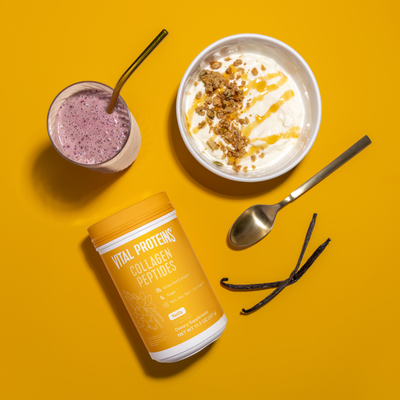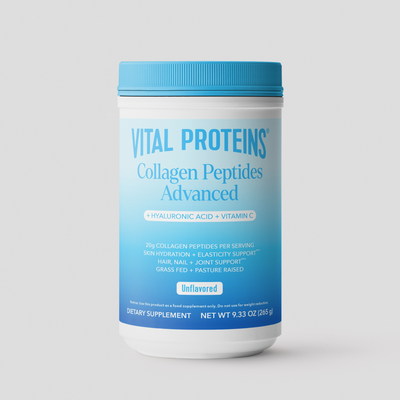May is Asian American and Pacific Islander (AAPI) Heritage Month, which celebrates the key role the AAPI community has played in American history. In honor of AAPI month, Vital Proteins is making a donation to Stop AAPI Hate. The Stop AAPI Hate coalition was founded during the COVID-19 pandemic to track, respond to, and address the escalation of hate incidents against Asian Americans and Pacific Islanders in the United States. Now at the forefront of the national movement to end anti-AAPI hate, Stop AAPI Hate seeks to advance equity and justice for all through its research, youth, policy advocacy, community capacity building and narrative change programs.
In honor of AAPI Heritage Month, we’re highlighting Vital employees as they share their personal experiences on professional growth, overcoming cultural challenges and why it’s important to bring their authentic selves to work every day.
The panel included Rey K., General Counsel; Kunal N., Chief Operating Officer; Hanna L., Senior Director, Brand Creative & Content and Joe V., VP, Strategic Operations. Here’s what the four employees that came together for our roundtable discussion had to say.
Responses have been edited for clarity and conciseness. You can watch the whole discussion on our YouTube channel.

What stereotypes have you faced in the professional world?
Rey K: One of my core memories of being stereotyped was maybe five years after I graduated from law school, I got this great job running North American M & A for a huge real estate company. I got on the phone with about 15 people from Wisconsin. That's where the deal was being run out of I was in LA and the attorney running the other side of the deal turns to me and says, “Wow, your last name is Kim. You must be Korean.” I'm like “Yeah, yeah.” Then he says your English is so good. I saw red and I had to politely excuse myself off the phone. I marched into the office of the president of the North Americas, I told him what happened. And I looked at him because I thought he was gonna be mad. And he was like, “You know what? You did the right thing. That's not the type of business we want to run.” And he killed the deal.
Hanna L: It’s so funny that’s your core memory in your career. Because a lot of the times when I think about some of the stereotypes that I’ve overcome, it has to do with my speech. I’ve had phone calls with people and then when I meet them in person, they’re like, oh my gosh, I just figured you would be like a blonde-haired, blue-eyed person because of the way that you speak. It’s just so articulate. I think it’s because people stereotype Asians to have a certain accent.
Kunal N: I think that when people are faced with what they think is unexpected or not typical from a certain person, they they’re surprised and they express that and they don’t realize that it comes off as quite offensive. I have a story from the days back when I was an attorney, I was a public defender in North Carolina and a lot of my clients didn’t realize that I am Indian or of Indian heritage, but they really liked me. So they thought they were saying something positive when they would say, please your honor, may I have the Mexican as my attorney. I had to calmly explain that I am not from Mexico. I am originally from India, but you know, I, I respect you wanting to be my client, but I am from India. So it’s one of those things where it's sometimes the most hurtful pieces are the, the well-meaning types of pieces that they just don't realize is quite offensive. But I think that gives us a chance to educate and to talk about our heritage.
What Is Your Favorite Tradition?
HL: One of my favorite traditions in our family that we do over the holidays is to gather around the kitchen table and make dumplings. In Korean culture, making dumpling symbolizes longevity, success and prosperity. And I just remember it being just a fun activity. The art of making a dumpling is just so symbolic to our culture. And it’s also something that I love being able to pass down to my kids.
KN: There’s a particular tradition from my Indian heritage which is when you move into a new home, you have a bless this house ceremony to get rid of the bad spirits and really welcome in all the good spirits and all the good feelings. We’re about to move into a new house. And I would love to do that and I would love to have my parents there for that because it’s a special time when we can embrace our heritage in a new venture.
Joe V.: The place where I come from, the South of India has a tradition very similar to what you said [Hanna]. Once a year, there is this harvesting festival where families get together and they make multiple different types of fruits and vegetables and it’s all eaten on a plant and leaf. And people dress in a traditional way. This is all about celebrating a mythological king who came down to help his people. So that’s one thing I really want to pass on to my kids. It’s fun.

What do you love about your heritage?
JV: Three things: food, food and food. I used to own an Indian restaurant.
RK: I love Korean food. My grandmother was an excellent cook. And she used to make homemade kimchi. We grew up in Massachusetts and after the rain we’d walk the forest and pick out these weird mushrooms. I guess we were foraging before it was cool.
HL: My favorite part of South Korean culture and my heritage is family values. I think being raised to be able to put family first is something that I take really big pride in. And I carry with me to this day.
KN: You know what I also really, really love about my Indian heritage is that a lot of our celebrations are just so colorful. We have Diwali, which is the festival of lights we have Holi, which is festival of colors where we have this thing in major cities where people are throwing colors and colorful water on each other. It’s such a beautiful thing to be a part of.
What cultural views of mental wellness are important to you?
RK: Asian cultures are centered around the collective versus the individual, and mental health is a very individualistic journey. There are a lot of practices in Asian culture that celebrate mental health meditation. The entire Buddhist culture is based on meditation and your internal voyage. So I don’t think it’s stigmatized, I think it’s just treated differently.
KN:Mental health is health and wellness. One of the most life-changing events that I ever had was I went on a 10-day silent meditation retreat. It was a time to learn this particular Buddhist meditation practice and to look inward.

What can employers do to uplift minority communities?
HL: It’s been really amazing to see how many different cultural initiatives that we [at Vital] support. I think being able to embrace different backgrounds and have that be exemplified through our content is something that we really take pride it in. Even with this conversation, being able to really talk about our differences and embrace the people around us with different backgrounds and open up that dialogue is something that I am really excited about.
RK: It goes back to the core of how we innovate at Vital. It’s progress over perfection. You know, there’s never going to be a world where everybody’s going to get along no matter how much we will it to be. So as long as we’re taking these baby steps forward, I think that’s the best that we can do. And we just have to hold each other accountable to that.
JV:What I’m super excited about what we do at Vital is making a conscious effort in actually celebrating diversity and empowering our team members and engaging with everybody. I think it’ll be our strength.





















